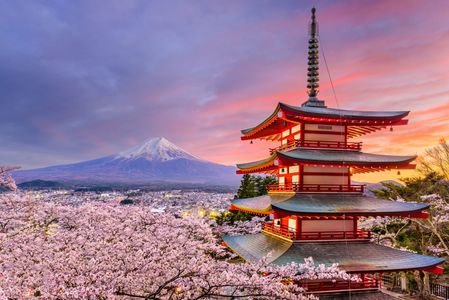Cultural Immersion: Discovering Japan's Rich Heritage and Traditions
 Anna Harrison
12 Jun, 2024
10 mins read
28
Anna Harrison
12 Jun, 2024
10 mins read
28

Japan, a country where ancient traditions seamlessly blend with modern innovation, offers a unique cultural immersion experience that captivates travelers from around the world. From centuries-old temples and shrines to vibrant festivals and time-honored customs, Japan's rich heritage and traditions provide a fascinating journey through its history and culture. Join us as we explore the many facets of Japan's cultural tapestry and uncover the timeless practices that make this nation so extraordinary. If you're planning your trip, consider exploring the various Japan tour packages available, offering convenience and curated experiences for your adventure in this captivating country.
The Splendor of Japanese Temples and Shrines
One of the most profound ways to experience Japan's cultural heritage is by visiting its temples and shrines. These sacred sites, often set amidst breathtaking natural surroundings, offer a glimpse into the spiritual practices that have shaped Japanese society for centuries.
Senso-ji Temple: A Historic Landmark
In Tokyo's Asakusa district, Senso-ji Temple stands as a beacon of history and devotion. Founded in 645 AD, it is Tokyo's oldest temple and a significant symbol of Japanese Buddhism. As you approach the temple through the bustling Nakamise Street, lined with traditional shops and stalls, the imposing Kaminarimon (Thunder Gate) greets you with its giant red lantern. Inside, the main hall houses a revered statue of Kannon, the Buddhist goddess of mercy. The temple's serene gardens and pagodas create a peaceful retreat from the city's hustle and bustle, allowing visitors to reflect and soak in the spiritual ambiance.
Fushimi Inari Shrine: A Pathway to Tradition
In Kyoto, the Fushimi Inari Shrine offers an iconic and unforgettable experience. Famous for its thousands of vermilion torii gates that form a winding path up Mount Inari, this Shinto shrine is dedicated to Inari, the god of rice and prosperity. Walking through the tunnel of gates, each inscribed with the names of donors, is a mesmerizing journey that symbolizes the connection between the physical and spiritual worlds. The hike to the summit provides panoramic views of Kyoto, making it a rewarding adventure that blends physical exertion with spiritual reflection.
Traditional Tea Ceremony: The Art of Zen
The Japanese tea ceremony, or "chanoyu," is a quintessential expression of Japanese aesthetics and Zen philosophy. This ritualistic preparation and consumption of matcha (powdered green tea) is not merely about drinking tea but about mindfulness, harmony, and respect.
The Essence of Chanoyu
Participating in a tea ceremony offers a profound cultural experience. The host meticulously prepares the tea, following precise movements and gestures that have been passed down through generations. Guests are invited to appreciate the simplicity and elegance of the tea room, often adorned with seasonal flower arrangements and calligraphy scrolls. The tranquil atmosphere encourages introspection and a deep connection with the present moment.
Experiencing the Ceremony
In cities like Kyoto, you can find numerous tea houses that offer authentic tea ceremony experiences. One such place is the En Tea House, where skilled tea masters guide visitors through the intricacies of chanoyu. As you sip the frothy, vibrant green matcha, you'll gain a deeper appreciation for the cultural significance and aesthetic beauty of this time-honored tradition.
Festivals: Celebrating Japan's Cultural Vibrancy
Japan's festivals, or "matsuri," are vibrant celebrations that showcase the country's rich cultural heritage and communal spirit. Throughout the year, various regions host festivals that honor deities, mark seasonal changes, and celebrate historical events.
Gion Matsuri: Kyoto's Grand Celebration
Gion Matsuri, held in Kyoto every July, is one of Japan's most famous festivals. Originating in the 9th century to appease the gods during an epidemic, it has evolved into a month-long celebration featuring elaborate processions, traditional music, and dance performances. The highlight is the Yamaboko Junko parade, where intricately decorated floats, resembling mobile shrines, are pulled through the streets by teams of participants. The festival atmosphere is electric, with locals and tourists alike donning yukata (summer kimonos) and enjoying street food and games.
Awa Odori: Dancing in Tokushima
In Tokushima, the Awa Odori festival in August invites everyone to join in the spirited dance known as "Odori." This centuries-old tradition dates back to the 16th century and features dancers in colorful costumes moving to the lively beat of traditional music. The infectious energy and joy of Awa Odori make it a must-experience event, where the line between spectators and performers blurs, creating a sense of unity and celebration.
Kimono: The Elegance of Traditional Attire
The kimono, Japan's traditional garment, embodies the country's aesthetic principles of simplicity, elegance, and harmony with nature. Wearing a kimono offers a tangible connection to Japan's cultural heritage and an appreciation for the craftsmanship involved in its creation.
The Beauty of Kimono
Kimonos are often made from luxurious silk and feature intricate designs that reflect the seasons, such as cherry blossoms in spring or maple leaves in autumn. The process of dressing in a kimono, with its many layers and precise folds, is an art form in itself, requiring skill and patience. The obi (wide belt) is tied in elaborate knots, adding to the garment's elegance.
Experiencing Kimono Culture
Visitors to Japan can immerse themselves in kimono culture by renting one for a day. Cities like Kyoto and Tokyo have numerous rental shops where you can choose from a variety of kimonos and receive assistance in dressing. Strolling through historic districts such as Gion in Kyoto or Asakusa in Tokyo while wearing a kimono offers a unique perspective and deeper connection to Japan's cultural heritage.
Japanese Gardens: Harmony and Serenity
Japanese gardens are renowned for their meticulous design and serene beauty, reflecting the principles of Zen Buddhism and Shintoism. These gardens offer a tranquil escape from the bustling cities and a chance to connect with nature's beauty.
Ryoan-ji: The Zen Rock Garden
In Kyoto, Ryoan-ji Temple is home to one of Japan's most famous rock gardens. This minimalist garden features an arrangement of fifteen rocks set in a sea of white gravel, which is meticulously raked to represent ripples in water. The garden's simplicity and tranquility encourage meditation and contemplation, allowing visitors to find peace amidst the chaos of daily life.
Kenroku-en: A Garden of Six Attributes
In Kanazawa, Kenroku-en is considered one of Japan's three most beautiful gardens. Its name translates to "Garden of Six Attributes," referring to the six qualities that make a perfect garden: spaciousness, seclusion, artifice, antiquity, watercourses, and panoramas. Strolling through Kenroku-en, you'll encounter winding paths, tranquil ponds, and seasonal flora that create a harmonious and ever-changing landscape.
Conclusion: Embracing Japan's Cultural Riches
Immersing yourself in Japan's rich heritage and traditions offers a profound and enriching travel experience. From the serenity of ancient temples and the elegance of tea ceremonies to the vibrant energy of festivals and the timeless beauty of kimonos and gardens, Japan's cultural treasures provide a deeper understanding of this remarkable country. Whether you're exploring historic landmarks, participating in traditional rituals, or simply enjoying the natural beauty, Japan invites you to connect with its past and present, creating memories that will last a lifetime.
Written By:
Anna Harrison



Hotels at your convenience
Now choose your stay according to your preference. From finding a place for your dream destination or a mere weekend getaway to business accommodations or brief stay, we have got you covered. Explore hotels as per your mood.





